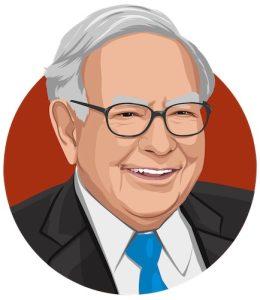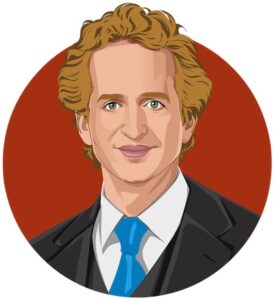As of July 2025 this site is no longer being updated.
Please visit our new site at ravenvaluepartners.com
Thanks for all the support!
/Peter
Stay ahead
The latest insights from legendary investors and a few thoughts from our own end.
- By Borsgade
Julian Robins, Head of Research and co-founder of UK based Fundsmith, shared compelling insights about quality investing and market dynamics in this recent podcast. Robins, who has been instrumental in managing the firm's flagship equity fund alongside Terry Smith since 2010, brings extensive experience from his career spanning stockbroking and investment banking since 1984. The discussion revealed Fundsmith's disciplined approach to navigating current market uncertainties, from AI investment trends to changing consumer behaviors. Julian emphasized the importance of focusing on companies with sustainable competitive advantages that can compound returns over decades, rather than getting distracted by short-term market noise. His
- By Borsgade
In a comprehensive interview, Thomas Shrager and Jay Hill from the renowned New York value investing boutique Tweedy, Browne articulate their belief that the most compelling investment opportunities currently lie outside the United States. The veteran fund managers, who oversee portfolios for the 104-year-old firm, explain that international markets offer dramatically better value propositions than the overvalued U.S. equity market, which they describe as "priced for perfection" at 24 times earnings.
- By Borsgade
Professor Aswath Damodaran’s latest analysis challenges the conventional wisdom surrounding alternative investments, revealing significant gaps between marketing promises and actual performance. Aswath examines how institutional and individual investors have increasingly embraced alternatives like hedge funds, private equity, and venture capital, often with disappointing results despite decades of compelling sales pitches. Alternative investments have gained mainstream acceptance over the past two decades, moving beyond their traditional institutional confines to target individual investors. The core argument for these investments rests on two pillars: their supposedly low correlation with traditional stocks and bonds, and their potential to generate excess returns through superior management
- By Borsgade
Michael Mauboussin, Head of Consilient Research at Morgan Stanley, delivered a compelling keynote presentation at the Ben Graham Centre for Value Investing's 2025 conference, addressing how the rise of intangible assets has fundamentally altered the landscape of value investing. Drawing from nearly a century of investment wisdom while adapting to modern realities, Mauboussin argues that traditional accounting methods have become increasingly inadequate for evaluating companies in today's intangible-heavy economy. His presentation reveals that intangible investments now represent 1.7 times tangible investments in the U.S. economy, a complete reversal from 1977 when tangible investments dominated by a factor of 1.4.
- By Borsgade
Clifford Asness of AQR Capital Management revisits his 1999 rejected paper that challenged one of the most common arguments against market timing. The widespread belief that missing just a few of the market's best days destroys long-term returns is fundamentally flawed, according to Asness. His analysis shows that while missing the best performing days does hurt returns, missing the worst performing days provides symmetrical benefits. The author demonstrates through both historical data and simulations that this "evidence" against market timing is mathematically obvious and essentially useless for investment decision-making. Asness argues that legitimate criticisms of market timing should focus on
- By Borsgade
In this special celebratory episode from The Investor's Podcast, host William Green shares his personal observations from attending the annual shareholder meeting in Omaha where the announcement was made, describing it as the most joyful meeting he's ever attended. The episode features powerful highlights from Green's previous conversations with legendary investors including Joel Greenblatt, Nick Sleep, Thomas Russo, Chris Davis, Chuck Akre, and Christopher Bloomstran, all discussing Buffett's profound influence on their investment approaches.
- By Borsgade
Two legendary portfolio managers, Chris Davis and Bill Miller, engaged in a comprehensive discussion about navigating today's volatile investment landscape, drawing from their combined decades of experience managing billions in assets. The conversation, structured around nine key topics, covers everything from investment temperament and market volatility to emerging technologies and geopolitical challenges. Miller, famous for outperforming the S&P 500 for 15 consecutive years while managing the Legg Mason Value Trust, and Davis share insights on stewardship, patience, and contrarian investing approaches. The discussion emphasizes the importance of long-term thinking, adaptability, and maintaining perspective during uncertain times.
Investment philosophy
There are countless ways to invest and even more aspects to keep in mind if your investments are to be successful. We have compiled the most important principles for the individual long-term investor.
Popular topics
Find inspiration across topics
AI
Alphabet
Apple
AQR
Aswath Damodaran
ATP
Banking Crises
Benjamin Graham
Berkshire Hathaway
Bill Ackman
Bill Nygren
Bridgewater
Charlie Munger
China
Christopher Bloomstran
Christopher Davis
Cliff Asness
Ferrari
First Eagle
François Rochon
Guy Spier
Howard Marks
Karen Karniol-Tambour
Kurt Kara
Letter to Shareholders
Macro economy
Maj Invest
Matthew McLennan
Meta
Michael Mauboussin
Mohnish Pabrai
Nvidia
Nykredit
Oaktree Capital Management
PFA
Polen Capital
Ray Dalio
Risk Management
Seth Klarman
Sustainability
Thomas Gayner
Thomas Shrager
Tweedy Browne
Value Investing
Warren Buffett
Popular pages
Find the most visited pages on Borsgade







